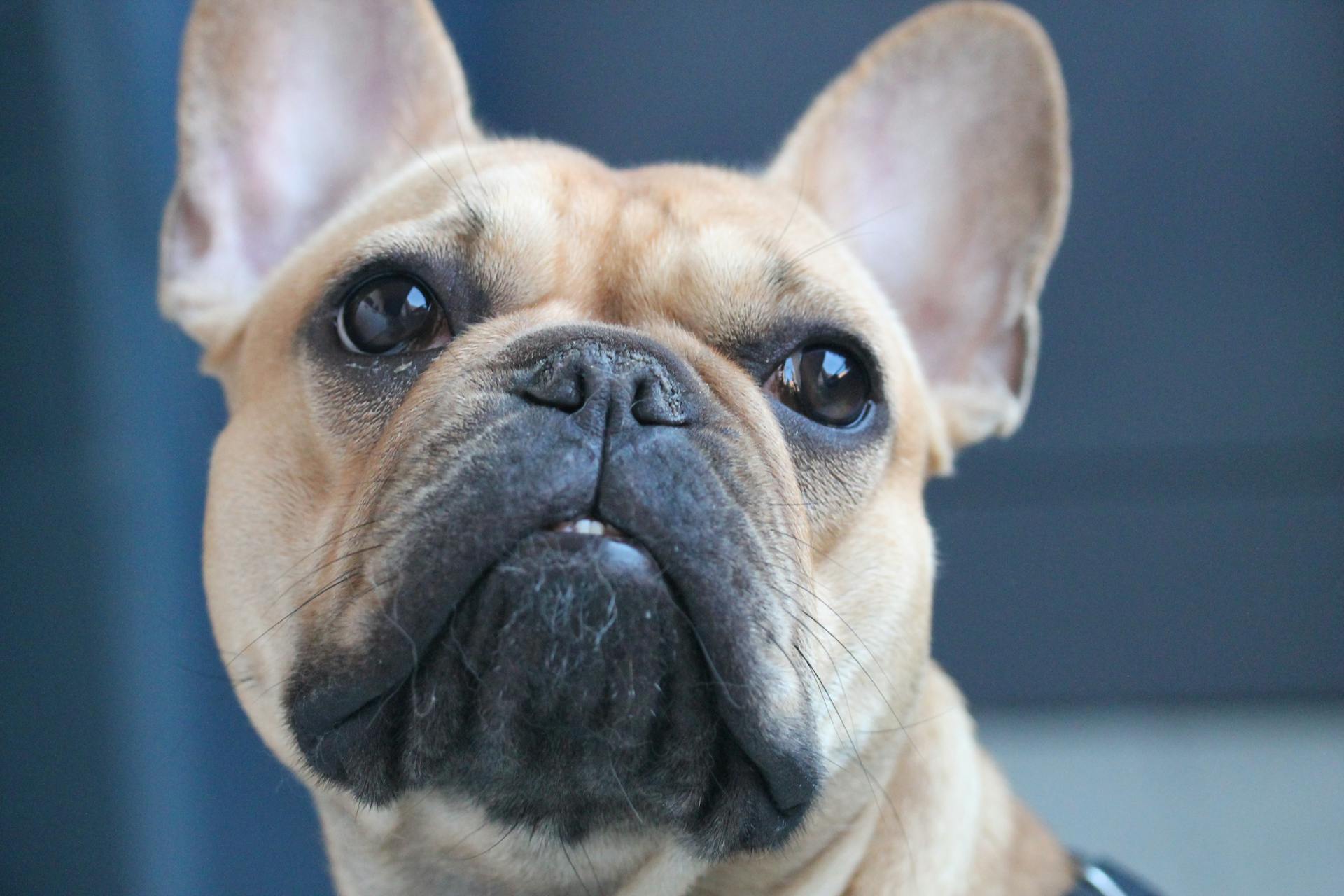
Goldendoodles have become increasingly popular as family pets in recent years, but like any breed, they have their pros and cons. One of the main benefits is their intelligence, which makes them highly trainable and easy to teach new tricks.
Their friendly and outgoing personalities also make them great with children and other pets, as they are naturally social animals. However, their high energy levels require regular exercise and mental stimulation to prevent boredom and destructive behavior.
Despite their size, Goldendoodles are known for being relatively low-shedding, making them a great option for people with allergies or who prefer less dog hair. They also tend to be relatively healthy, with an average lifespan of 10-15 years.
For your interest: Pros and Cons of Great Pyrenees
Breed Characteristics
Goldendoodles are known for their affectionate personality and willingness to please, making them a popular choice for families. They have a gentle temperament and are highly trainable, which is why they're often used as therapy dogs, guide dogs, and search and rescue dogs.
Their affection level is high, which means they love people and love to be around them. They're also very friendly, which makes them great with kids and other pets. In fact, they're one of the most kid-friendly breeds out there.
Goldendoodles have medium exercise needs, but they do require regular physical and mental stimulation to prevent boredom and destructive behavior. They're high-energy dogs that need to run around and play regularly.
One of the best things about Goldendoodles is their intelligence. They're highly intelligent dogs that are easy to train, which is why they're often used in agility and obedience training. They're also very trainable for specific tasks like guiding the blind or assisting people with disabilities.
Here's a summary of Goldendoodle characteristics:
Overall, Goldendoodles are a great choice for families and individuals who want a loyal, loving, and highly trainable companion.
Health and Care
Goldendoodles are generally a healthy breed, but like all breeds, they can be prone to certain health issues. Regular exercise and a balanced diet can help prevent many of these problems.
Goldendoodles may inherit health issues from their parent breeds, such as hip dysplasia, eye disorders, and skin conditions. A reputable breeder who prioritizes breeding healthy dogs can help minimize the risk of these issues.
To keep your Goldendoodle healthy, schedule regular veterinary check-ups, including annual eye exams and hip exams to catch any potential issues early. Regular grooming, including weekly brushing and trimming, can also help prevent skin problems.
Here are some common health issues Goldendoodles may face:
- Hip Dysplasia: A common problem in poodles and golden retrievers that can be checked with a hip exam.
- Eye Disorders: Eye issues are common in poodles and golden retrievers, so annual eye exams are a good idea.
- Skin Conditions: Allergies can lead to skin and ear infections, so it's essential to check and clean the ears as needed and keep them dry.
Health Issues
Goldendoodles are generally healthy dogs that can live 10-15 years, but they are prone to common health conditions of the Poodle and Golden Retriever breeds. They may inherit health problems associated with poodles and golden retrievers, but crossbreeding may reduce the chances of some health problems due to their genetic diversity.
To ensure your Goldendoodle's health, it's essential to find a reputable breeder who is committed to breeding healthy dogs. They should thoroughly test their breeding stock by performing OFA or PennHip testing on their hips, echocardiograms with a cardiologist, and extensive genetic testing prior to breeding.
Consider reading: Lab vs Golden Retriever Pros and Cons

Goldendoodles are at risk of inheriting health problems from both golden retrievers and poodles, including hip dysplasia, subvalvular aortic stenosis, and eye disorders. These health risks are more likely if you don't choose a responsible breeder who health tests their dogs.
Here are some common health issues that Goldendoodles may experience:
- Hip Dysplasia: a condition where the hip joint doesn't form properly, leading to arthritis and mobility issues.
- Eye Disorders: including eye issues common in poodles and golden retrievers, such as cataracts and glaucoma.
- Skin Conditions: including allergies, which may lead to skin and ear infections.
Regular check-ups with your veterinarian, including annual eye exams and hip exams, can help identify potential health issues early on.
Dog Nutrition
When choosing food for your F1B Goldendoodle, look for the highest quality options you can afford. This means finding dog foods that follow AAFCO guidelines.
The best dog foods have been formulated by a veterinary nutritionist and have undergone feeding trials. This ensures that the food is safe and nutritious for your dog.
You can start by checking the recommended serving size on the bag to determine how much to feed your doodle. From there, you can adjust the amount based on whether or not your dog’s weight fluctuates.
Calculating the number of calories your dog should eat on a daily basis can be done using an online calorie calculator.
Recommended read: Dogs Raw Food Diet Pros Cons
How Long Do They Live?

F1B goldendoodles live about 10 to 15 years on average, though smaller doodles may live a year or two longer. Their lifespan is relatively long, making them a great companion for many years.
Regular exercise is essential for their overall health and well-being, which can contribute to a longer and healthier life.
Grooming and Maintenance
Goldendoodles require regular grooming to prevent matting and tangling, with weekly brushing a must to keep their coats healthy. Brushing daily is even better, especially for longer coats.
Their curly coats can be prone to matting, so regular grooming is essential. Expect to brush your Goldendoodle about once every week or two if you choose to leave their coat in its natural state.
Goldendoodles need a bath only when it's absolutely necessary, or their coat and skin will lose necessary oils and moisture. Brush their teeth at least two or three times a week to remove tartar buildup and bacteria.
See what others are reading: Grooming for Golden Doodles
Trim their nails once or twice a month if they don't wear them down naturally to prevent painful tears and other problems. Their ears should be checked weekly for redness or a bad odor, which can indicate an infection.
Regular grooming from an early age can make a big difference in your Goldendoodle's behavior and overall health. Accustom your Goldendoodle to being brushed and examined when they're a puppy, and make grooming a positive experience filled with praise and rewards.
Worth a look: Black Parti Goldendoodle
Do They Shed?
F1B Goldendoodles can shed a lot, especially if they take after their golden retriever parent. However, if they inherit their poodle parent's coat, they may not shed much at all.
Their shedding habits really depend on which breed they take after more. If it's the poodle, they'll likely be a low-shedding option, but if it's the golden retriever, they'll shed more.
No dog is truly hypoallergenic, so even if your F1B Goldendoodle doesn't shed much, they'll still lose hair and release some pet dander into your home.
To minimize shedding, regular brushing is a must - at least once a week.
If this caught your attention, see: Miniature Poodle Pros and Cons
Grooming Guide
The Goldendoodle's coat is a beautiful, curly mess that requires regular maintenance to keep it looking its best.
You'll need to brush your Goldendoodle's coat at least once a week, but more frequently if they have long hair. Most owners prefer to have their coats trimmed regularly to prevent matting and tangling.
A good brushing session should take about 10-15 minutes, depending on the length and thickness of your dog's coat. You can use a slicker brush or a pin brush to detangle their fur, starting from the ends and working your way up.
Goldendoodles need to be bathed every few months to keep their skin and coat healthy. However, they don't need to be bathed frequently, as this can strip their coat of its natural oils.
Don't forget to trim your Goldendoodle's nails regularly, ideally once a month. If you hear them clicking on the floor, it's a sign that they need to be trimmed.
Discover more: Goldendoodle
You should also check your dog's ears weekly for signs of infection, such as redness or a bad odor. Wipe them out with a cotton ball and a gentle ear cleaner to prevent infections.
Daily brushing is even better if you want to prevent gum disease and bad breath. Brush your Goldendoodle's teeth at least two or three times a week, and trim their nails regularly to keep them healthy and happy.
Behavior and Training
Goldendoodles are known for their gentle temperament, making them ideal for households with kids and elders. They especially benefit from having a strong bond with their human family and being part of the daily routine.
Goldendoodles can become vocal to alert their humans, but they're not big barkers overall. They're prone to separation anxiety if they don't receive the proper amount of social stimulation, so it's essential to provide them with plenty of interaction.
Goldendoodles are intelligent and easily trained, excelling in activities like agility and obedience classes. They respond well to positive reinforcement techniques, using treats to reward good behavior.
Are They Intelligent?
F1B goldendoodles are considered an intelligent mixed breed because they are quick learners and have superb observation skills.
They can even tell what emotions their owners are feeling, making them highly attuned to their family's needs.
Their intelligence and eagerness to please make them easy to train, especially with reward-based training methods.
Using positive reinforcement is the best way to train a goldendoodle, as it motivates them to learn and please their owners.
Their intelligence also helps them navigate social situations, making them friendly and outgoing with people and other animals.
Behavior
Goldendoodles are prone to separation anxiety if they don't receive enough social stimulation, so it's essential to provide them with plenty of attention and interaction.
They are known for their gentle temperament, making them an ideal breed for households with kids and elders.
Goldendoodles are not big barkers, but they can become vocal to alert their humans.
They benefit greatly from having a strong bond with their human family and being part of the daily routine.
With proper training, Goldendoodles can excel in activities like agility and obedience classes.
They respond well to positive reinforcement techniques, such as using treats to reward good behavior.
Training Goldendoodle puppies at a young age is crucial to develop good habits that will last a lifetime.
With patience and consistency, you can teach your Goldendoodle many tricks and commands.
However, their intelligence can sometimes be a double-edged sword, as they can train their owners to suit their own purposes.
To avoid being outsmarted by your Goldendoodle, use positive-reinforcement training methods and be mindful of their cleverness.
Overall, Goldendoodles are eager to please and thrive on attention and interaction, making them a wonderful addition to any family.
For more insights, see: Pros and Cons of Shock Collars
Are Watchdogs?
Goldendoodles will bark to alert you of a stranger's presence, making them good at warning you of potential threats. They'll let you know someone's around, even if they won't necessarily do anything to stop them.
Their friendly nature means they're more likely to greet intruders with wagging tails than defend your home. This is especially true for smaller goldendoodles with teddy bear faces that don't exactly look intimidating.
Living with a Goldendoodle
Goldendoodles require regular grooming to prevent matting and tangling of their fur, which can be time-consuming and expensive.
They need to be brushed daily, and some owners even use a deshedding tool to help remove loose hair.
Their high energy level means they need at least an hour of exercise per day, which can be a challenge for busy owners.
Goldendoodles are highly social dogs and thrive on interaction with their family, so they make great companions for people who want a loyal friend.
They are also known to be great with children, but as with any breed, it's essential to supervise interactions between dogs and young kids.
Goldendoodles are highly intelligent and respond well to positive reinforcement training, making them relatively easy to train compared to other breeds.
Worth a look: Great Doodle Dog
Frequently Asked Questions
Are Goldendoodle good house dogs?
Yes, Goldendoodles make excellent house dogs for families due to their friendly and patient nature. However, they may not be the best choice for security purposes.
Do Goldendoodles bark a lot?
Goldendoodles are known to be one of the breeds least likely to bark excessively, but they can still make noise when excited or upset. They're generally a quiet breed, but occasional barking can still occur.
What not to do with a Goldendoodle?
Avoid punishing a Goldendoodle with physical harm or yelling, as this can hinder their training. Instead, use positive reinforcement techniques to help them learn and thrive.
What do vets say about Goldendoodles?
Vets agree that Goldendoodles are generally healthy dogs, but they can be prone to health issues common in Poodles and Golden Retrievers. Consult a reputable breeder to minimize the risk of inherited health problems.
Featured Images: pexels.com


